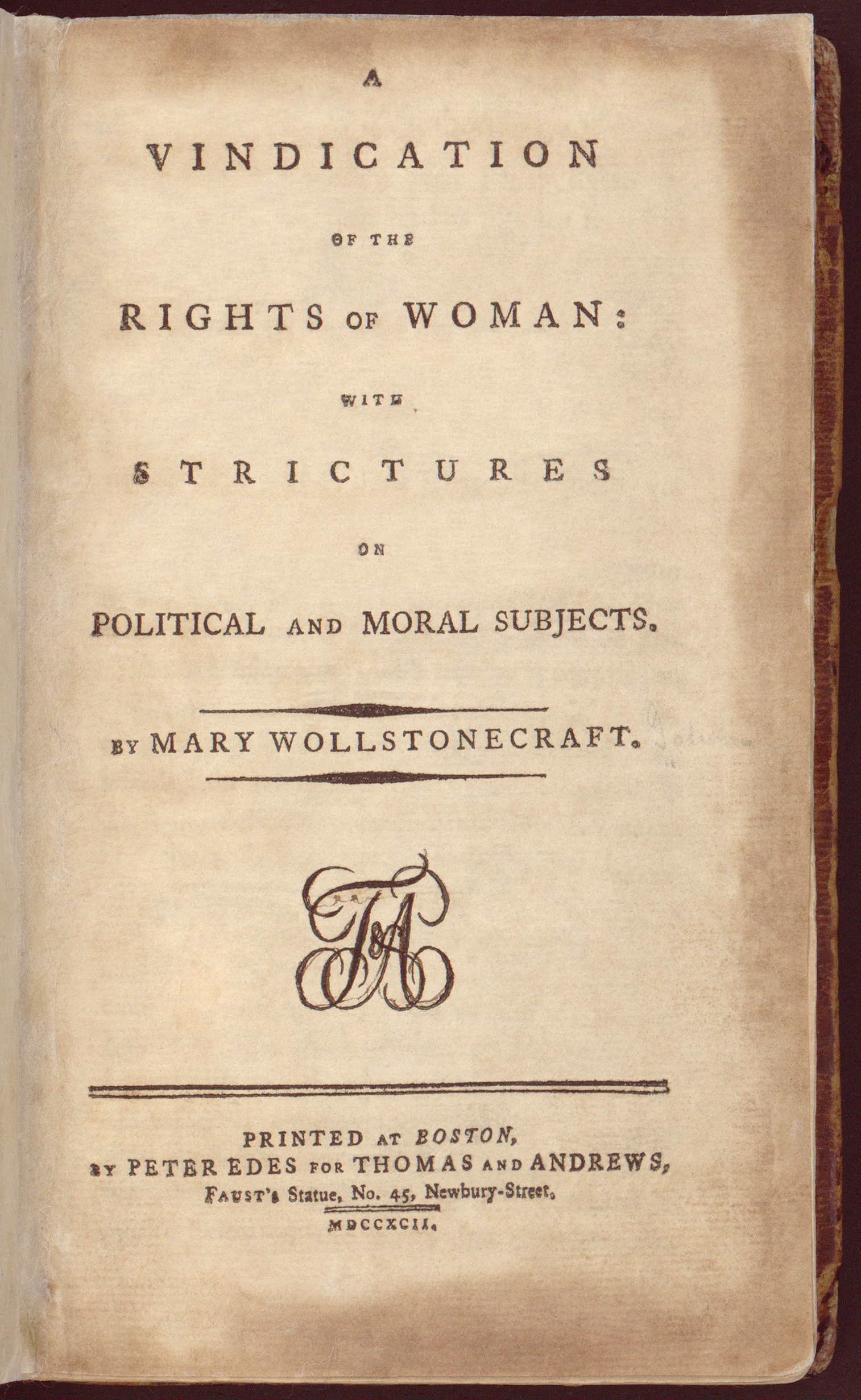
A Vindication of the Rights of Woman
A Vindication of the Rights of Woman: with Strictures on Political and Moral Subjects (1792), written by British philosopher and women's rights advocate Mary Wollstonecraft (1759–1797), is one of the earliest works of feminist philosophy. In it, Wollstonecraft responds to those educational and political theorists of the eighteenth century who did not believe women should receive a rational education. She argues that women ought to have an education commensurate with their position in society, claiming that women are essential to the nation because they educate its children and because they could be "companions" to their husbands, rather than mere wives. Instead of viewing women as ornaments to society or property to be traded in marriage, Wollstonecraft maintains that they are human beings deserving of the same fundamental rights as men.
Author
Wollstonecraft was prompted to write the Rights of Woman after reading Charles Maurice de Talleyrand-Périgord's 1791 report to the French National Assembly, which stated that women should only receive domestic education. From her reaction to this specific event, she launched a broad attack against double standards, indicting men for encouraging women to indulge in excessive emotion. Wollstonecraft hurried to complete the work in direct response to ongoing events; she intended to write a more thoughtful second volume but died before completing it.
While Wollstonecraft does call for equality between the sexes in particular areas of life, especially morality, she does not explicitly state that men and women are equal. Her ambiguous statements regarding the equality of the sexes have made it difficult to classify Wollstonecraft as a modern feminist; the word itself did not emerge until decades after her death.
Although it is commonly assumed that the Rights of Woman was unfavourably received, this is a modern misconception based on the belief that Wollstonecraft was as reviled during her lifetime as she became after the publication of William Godwin's Memoirs of the Author of A Vindication of the Rights of Woman (1798). The Rights of Woman was generally received well when it was first published in 1792. Biographer Emily W. Sunstein called it "perhaps the most original book of [Wollstonecraft's] century".[1] Wollstonecraft's work had significant impact on advocates for women's rights in the nineteenth century, particularly the 1848 Seneca Falls Convention which produced the Declaration of Sentiments laying out the aims of the women's suffrage movement in the United States.
Revision[edit]
Wollstonecraft was forced to write the Rights of Woman hurriedly to respond to Talleyrand and ongoing events. Upon completing the work, she wrote to her friend William Roscoe: "I am dissatisfied with myself for not having done justice to the subject ... Do not suspect me of false modesty – I mean to say that had I allowed myself more time I could have written a better book, in every sense of the word ... I intend to finish the next volume before I begin to print, for it is not pleasant to have the Devil coming for the conclusion of a sheet fore it is written."[71] When Wollstonecraft revised the Rights of Woman for the second edition, she took the opportunity not only to fix small spelling and grammar mistakes but also to bolster the feminist claims of her argument.[72] She changed some of her statements regarding female and male difference to reflect a greater equality between the sexes.[73]
Wollstonecraft never wrote the second part to the Rights of Woman, although William Godwin published her "Hints", which were "chiefly designed to have been incorporated in the second part of the Vindication of the Rights of Woman", in the posthumous collection of her works.[74] However, she did begin writing the novel Maria: or, The Wrongs of Woman, which most scholars consider a fictionalized sequel to the Rights of Woman. It was unfinished at her death and also included in the Posthumous Works published by Godwin.[75]